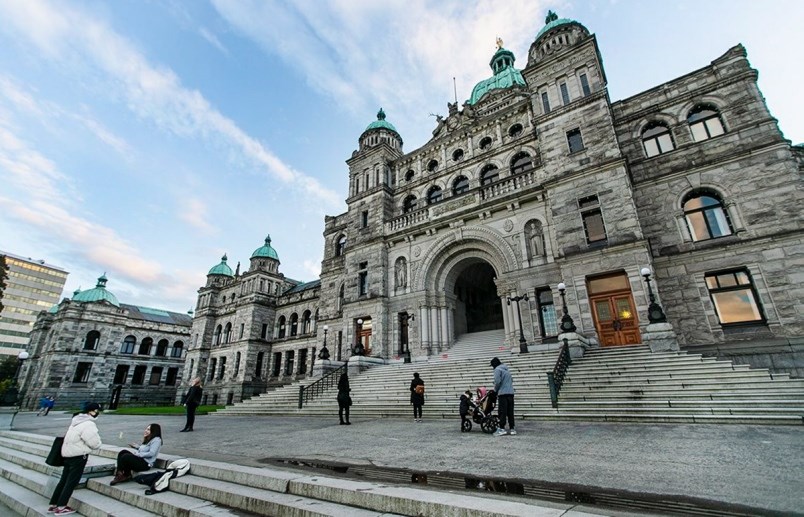It was a year of immense change in B.C. politics — a premier rewriting the rules on housing at a blistering pace, a BC Conservative party on the rise and a BC Liberal party in the grips of an identity crisis.
There’s no better example than the fledgling BC Conservatives, who began 2023 in obscurity with lone MLA John Rustad, and finished the year with two MLAs, official party status in the legislature and second place in public opinion polls after a surge of voter support.
“There is a shift in this province that people are open to the idea of a new coalition party, which is what the Conservative party is trying to be,” said Rustad.
“It's not about being Conservative, Liberal, NDP or Green. It's just about standing up for what's right, fighting for the average everyday person and being straight up.”
The Conservatives made waves, calling for an end to sexual orientation and gender identity (SOGI) learning in schools, the elimination of the carbon tax and the firing of provincial health officer Dr. Bonnie Henry.
Premier David Eby called it a concerning rise in toxic, far-right American-style political rhetoric. Others say the BC Conservatives are benefiting from confusion with Pierre Poilievre’s federal Conservative party (the two are not affiliated).
Conservative gains came at the expense of the BC Liberal party, which in April changed its name to BC United, and has since plummeted in voter recognition.
Leader Kevin Falcon said he’s confident the public will reconnect closer to the Oct. 19, 2024, provincial election. In the meantime, he said United successfully pushed the government to address failures in decriminalization, safe supply and drug addictions policies, amid frustration from local mayors and businesses about open drug use, crime and street disorder.
“We pointed out, very professionally, some of their legislation was very poorly thought out, clearly put together on a rushed basis, and hadn’t put together some of the unintended consequences,” said Falcon.
Unintended consequences could be attributed to the breakneck pace of the NDP government during its first full year under Premier Eby.
The premier unleashed a generational change in housing policy: Restricting Airbnb-style rentals, permitting quad-plexes on single family lots, legalizing secondary suites, authorizing condo towers at transit hubs, eliminating public hearings for most rezoning, and giving the province override power against intransigent municipalities.
“It was hands-down the busiest year I’ve had in politics,” said Housing Minister Ravi Kahlon.
“There’s been a lot. It’s been an intense year, but an important one for housing for I think generations forward.”
The province’s other political party, the BC Greens, also struggled for recognition in 2023. Leader Sonia Fursteanau accused Eby of shirking accountability as he hurtles forward with reforms.
“This fall what we saw was, yes, an agenda from this premier, but an agenda he wasn’t really willing to have questioned,” said Furstenau.
A major subtext to 2023 was the worsening affordability crisis, caused by rising interest rates, grocery prices and housing costs.
Eby used an unprecedented $5-billion surplus early in the year to ease financial pressures for municipalities and public transit. BC United said his small-scale rebates and tax credits for low-income residents fell short. BC Conservatives called for an end to fuel taxes, while the BC Greens demanded more investments in affordable housing.
The health system sunk further into crisis in 2023, as staff shortages led to closures of walk-in clinics, hospital and ERs across the province.
Health Minister Adrian Dix attempted a flurry of reforms. But closures persist and wait times in critical areas like cancer care have failed to improve.
The year ended with BC United calling on Dix to resign.
BC Ferries experienced one of the worst years in its history, with frequent breakdowns and staffing shortages on the busiest days of the year. Eby appointed a new CEO in March — but so far, it’s failed to make much of a difference.
The City of Surrey and NDP government spent the year in a public war of words after the NDP rejected the city’s request to revert from a municipal police force back to the RCMP. The city filed a court challenge in October. Shortly after, the NDP passed a new law mandating municipal policing.
This year also marked one of the worst wildfire seasons in memory, destroying hundreds of homes in the interior, costing more than $1 billion and leading to the deaths of six firefighters. All parties are divided on how to improve the wildfire system and tackle climate change.
The year closed with the province’s political parties in very different places than when 2023 started. While the NDP may have brought in the most actual reforms, the Conservatives had the biggest impact on upending the political landscape.
“This is what democracy should be, (people) should have choices,” said Rustad. “They should be able to have debates. It shouldn't be a choice between NDP and NDP-lite. We've now started providing that in the legislature.”
Rob Shaw has spent more than 15 years covering B.C. politics, now reporting for CHEK News and writing for Glacier Media. He is the co-author of the national bestselling book A Matter of Confidence, host of the weekly podcast Political Capital, and a regular guest on CBC Radio. [email protected]





